Research on critical discourses on the contemporary performing arts scene in Madrid, by Marta Popivoda and Ana Vujanović
The research on critical discourses on the contemporary performing arts scene in Madrid is organized within Matadero – El Ranchito, Madrid, and in collaboration with Artea.
Co-authors: Ana Vujanović, Marta Popivoda
“We are not the experts on cultural mapping who come to Madrid to ‘investigate’ its performing arts scene, nor we approach it as an exotic tribe. We define ourselves as ‘aliens’ to the scene, who are theoretically-politically laden. Thus, with our theoretical-artistic research we could hopefully give a challenging insight into the scene, being outside its circles, clans, and doxa. On the other hand, we see this research as a tool to re-think our own context and scene, as well as the concepts with which we operate.
Starting from the position of aliens, our research procedes in two phases. Before we came, we had known a few people active at the scene in Madrid: Catarina Saraiva, Juan Domínguez, Victoria Pérez Royo, and Isabel de Naverán. So, the first phase of the research comprises working sessions with them in order for us to get know about the scene and its critical discourses, from their subjective perspectives. These working sessions provide us with ‘second-hand’ knowledge, which serves as our ‘gate’ to the scene. Using the notes and diagrams made during the sessions, we make a summary and continue with the interviews about the key concepts, practices, and questions relating to the critical discourses, with several artists, theoreticians, and programmers from Madrid. In this phase, we again don’t use stable and solid facts and objects to be researched – except as side tools – but we make the interviews, which are always stories about the ‘things’ (objects and facts). This method is a certain theoretical choice, as the subjective stories of the actors of the scene tell us how the scene sees itself and discursively articulates itself. During this phase, we also try to indicate some connections between the notions, practices, and concepts that appear in the interviews. But we don’t try to evaluate them nor to propose one way of reading them. This rhizomatic net of interviews, together with our summary and notes should rather stay one of the possible images of the scene, created exactly at the inter-section of how the scene sees itself and how we could reflect it and give it back to its actors through our lens.”
Ana Vujanovic, Marta Popivoda, April 2011
http://escenasdiscursivas.tkh-generator.net/
http://elranchitomadrid.wordpress.com

